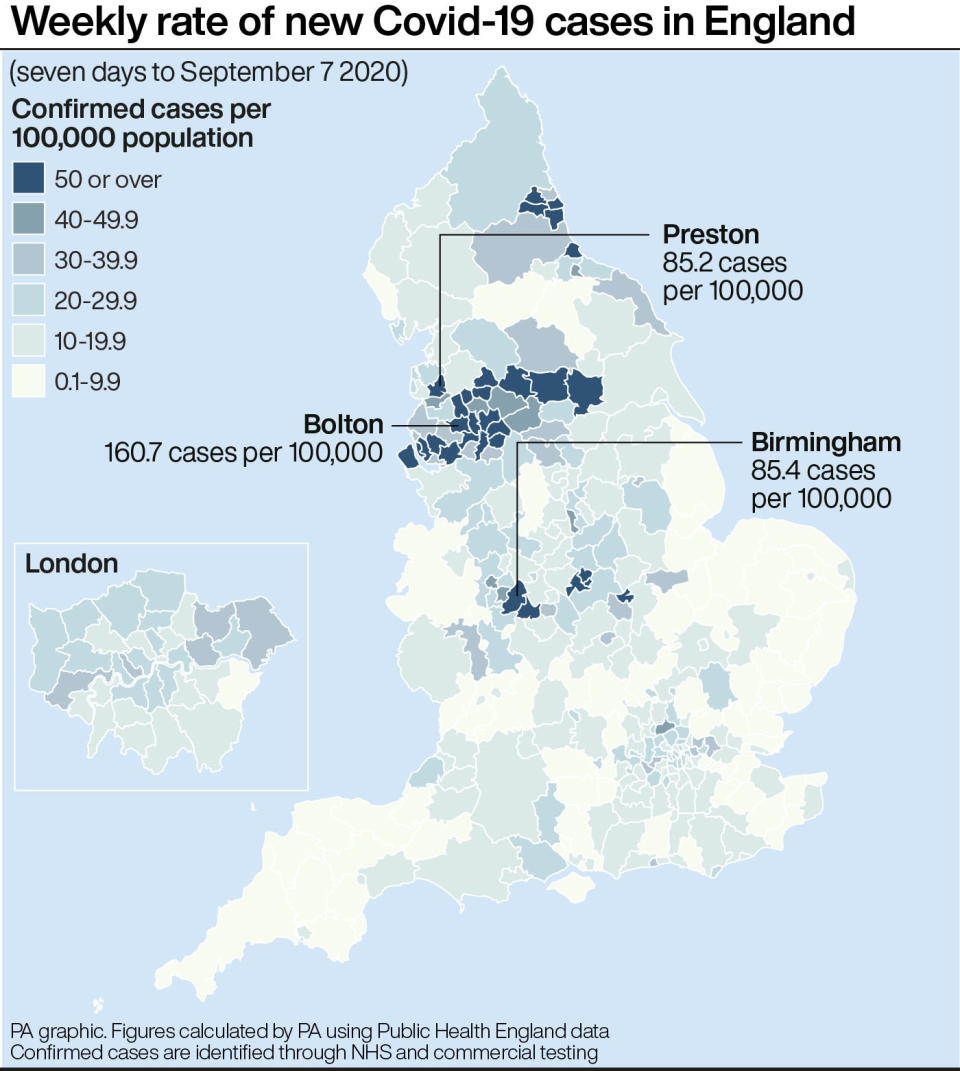Coronavirus could be increasing exponentially in all parts of country as R rate rises again

Rising R rate range comes amid criticism over Test and Trace numbers
Coronavirus cases rose by more than 2,000 for fifth consecutive day yesterday
The reproduction number, or R value, of coronavirus transmission across the UK has risen to 1 or above in all regions.
Data released on Friday by the Government Office for Science and the Scientific Advisory Group for Emergencies (Sage) shows the estimate for R across the UK is between 1.0 and 1.2.
The value represents the average number of people each COVID-19 positive person goes on to infect.
It comes the same week that cases rose hugely in England. 2,919 were reported on Thursday, 2,659 on Wednesday and 2,420 on Tuesday.
On Monday, 2,948 were reported while Sunday saw 2,988, the highest daily rise since 22 May.
Watch: Yahoo UK’s Health Editor, Alexander Thompson explain how coronavirus is treated

Meanwhile, an Imperial College study has found that England’s infections are doubling each week, and estimated R in England to be 1.7.
Rule of six
In response to the spike in cases, people in England will only be allowed to gather in groups of up to six people.
This applies to indoor and outdoor settings, and will be put into law, the government has said.
Boris Johnson said it “breaks my heart” to introduce the restriction.

Health secretary Matt Hancock has said the rules have been designed to be simple after the government came in for criticism that its coronavirus messaging has been confusing.
Speaking on BBC Radio 4, Hancock said: “The rules are really simple, I can say them in a sentence.
“Which is, you can’t gather in groups of more than six except for schools, work, those exceptional life events, and it’s super-simple.”
Read more: New interactive coronavirus map predicts next COVID hotspots
Exemptions include weddings and funerals, and organised sport can also go ahead.
A breach of the law could result in a £100 fine for the first offence.
Scotland is also going to have its own rule of six from Monday, but is not including children under 12 in its count.
COVID marshals
The government’s plan to introduce marshals who enforce the new social distancing rules will not have formal powers.
Boris Johnson has said the new marshals will “boost the local enforcement capacity”.
The government said they have already been used by Leeds City Council and Cornwall Council and other authorities will be encouraged to recruit them, using either volunteers or existing council staff.
They will probably have high-visibility clothing, a communities ministry spokeswoman has said, and tasks could include handing out masks and hand sanitiser in public places.
The idea has received a lukewarm response, with the chairman of the Metropolitan Police Federation saying officers were “absolutely baffled” by the announcement.
“Any help is good help but what I’d like to understand is what actually is their role, what are we asking them to do?” Ken Marsh said.
Read more: The area with the worst Test and Trace numbers
“Because if they don’t actually have any powers, you know what Joe Public will do very quickly. When the stick needs to be wielded then you need to have the ability to wield it.”
Councillor Nesil Caliskan, chair of the Local Government Association’s Safer and Stronger Communities Board, said: “This announcement has caused confusion among councils who need urgent clarity from the government on any extra resources and details on how it should work on the ground.”
Local lockdown latest
Various parts of England are under tighter coronavirus restrictions, which have been used to try and avoid returning to a nationwide lockdown when cases spike in a region.
In Bolton, residents have been told not to host people they don’t live with in their homes or gardens unless they are in their support bubble, or to go to other people’s homes.
They have also been told not to meet people they don’t live with in public venues, and Hancock said this will become law.
Casinos, skating rinks, bowling alleys and indoors play areas are not allowed to open, and night-time economy and leisure venues have been asked to close from 10pm to 5am every day.

Hospitality venues, like restaurants and cafes, should only provide takeaway food and drinks.
In parts of Greater Manchester, East Lancashire, Preston and West Yorkshire, people should not visit others they don’t live with at their homes unless they are in a support bubble and certain businesses must remain shut.
Leicester, the first of England’s local lockdowns, still has restrictions on meeting people you don’t live with in others’ homes or gardens.
Gyms, dance studios and swimming pools have been allowed to reopen.
Test and trace criticism
The government’s handling of NHS Test and Trace came under fire this week, with one of its experts apologising for a “pinch-point” emerging in the laboratory processing.
Earlier in the week, Labour MP Helen Hayes branded testing a “shambles” after her constituents reported difficulties in getting a test.
Sarah-Jane Marsh tweeted: “Can I please offer my heartfelt apologies to anyone who cannot get a COVID-19 test at present.
“All of our testing sites have capacity, which is why they don’t look overcrowded, it’s our laboratory processing that is the critical pinch-point.
“We are doing all we can to expand quickly.”
As part of the “Moonshot” project, Boris Johnson is hoping to expand testing and make use of advanced technology to allow a closer return to normality. He hoped progress could be made on this before Christmas.
Coronavirus: what happened today
Click here to sign up to the latest news and information with our daily Catch-up newsletter

 Yahoo News
Yahoo News 

